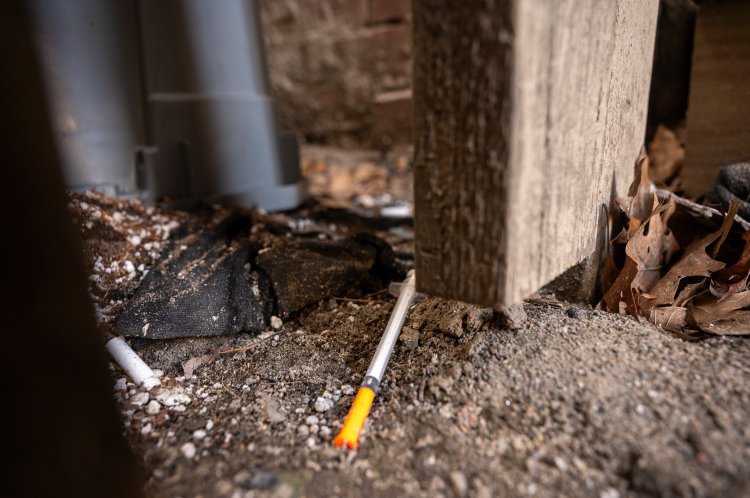
LEWISTON — State and local officials working in opioid response urged Lewiston officials Tuesday to make changes to a draft ordinance that would regulate local needle exchange programs.
The city’s attempt to draft an ordinance comes in response to ongoing concerns over needle waste in the community. State officials asked city councilors to work with them on a proposal that would not impact the state’s harm reduction model for battling the opioid crisis.
The harm reduction model is meant to reduce the shame and stigma of substance use while offering access to clean supplies that reduce transmission of blood-borne diseases such as hepatitis C and HIV. Those speaking Tuesday also said needle exchange programs often provide the first step for people seeking recovery.
While several councilors said they supported harm reduction efforts, they also said the issue of improperly discarded needles is impacting Lewiston families and businesses, and asked for the state’s help in addressing it.
A draft ordinance under consideration by the council would limit needle exchanges in the city to one-for-one, put a cap on how many syringe service providers can operate in the city, and regulate where they can be located.
Catherine Ryder, senior director of strategic initiatives for Spurwink, which operates one of two needle exchanges in Lewiston, recently testified against proposed state legislation that would revert state programs to the one-for-one ratio, saying it “directly contradicts decades of evidence-based public health research and poses a significant threat to community health and safety across Maine.”
A 2022 change moved away from a one-to-one needle exchange to a more needs-based model, under which programs can give out as many as 100 clean needles at a time.
Anne Sites, director of infectious disease prevention at the Maine Center for Disease Control and Prevention, told the council Tuesday that the state takes needle waste seriously and it’s an “issue that deserves attention,” but added, “We’re hoping we can address it while still maintaining life-saving (needle exchange) services.”
She added that the state believes the proposed ordinance “would be severely detrimental” to harm reduction efforts.
Gordon Smith, director of opioid response for Gov. Janet Mills’ office, said the state has seen progress under its model, with data showing fatal overdoses down significantly compared to when the one-for-one exchange was in place.
“There’s still too many, but we’re making progress,” he said. “And part of that progress is having harm reduction in place.”
The city of Sanford recently passed an ordinance requiring a one-for-one exchange at its syringe service program.
Lewiston officials said the main issues they are hearing from constituents center on the behaviors of clients in the vicinity of needle exchanges and needle waste, but some said they are not sure the draft ordinance will address that.

Councilor Josh Nagine said a lot of what was talked about during the workshop Tuesday “has nothing to do with the ordinance in front of us.”
He said he supports harm reduction, but there needs to be “responsibility to the community” in which needle exchange programs exist.
Smith said he agrees that needle waste is a problem.
“We know how much it hurts our efforts when a family can’t go to Kennedy Park because they find needles,” he said, but added it’s a “different issue than harm reduction.”
“We want to do both,” he said.
Smith said Bangor has contracted with an organization that conducts pickup days, while other cities such as Portland have attempted syringe buyback programs to incentivize bringing in more used syringes.
Zoe Brokos, executive director of the Church of Safe Injection on Main Street in Lewiston, said her organization did a cleanup day on Tuesday, and suggested that the city create a small group of people to focus on the issue of syringe litter.
“It shouldn’t fall on businesses and citizens to clean this up,” Councilor Michael Roy said.
Following the workshop, Mayor Carl Sheline said he’s “beginning to think” that the proposed ordinance “will not do what we think it will do.”
“This ordinance as presented will have far-reaching negative consequences for our recovery community and do nothing to remove needles from our parks,” he said, adding that he’d like to work with the local needle exchange programs to address needle waste.

We invite you to add your comments. We encourage a thoughtful exchange of ideas and information on this website. By joining the conversation, you are agreeing to our commenting policy and terms of use. More information is found on our FAQs. You can modify your screen name here.
Comments are managed by our staff during regular business hours Monday through Friday as well as limited hours on Saturday and Sunday. Comments held for moderation outside of those hours may take longer to approve.
Join the Conversation
Please sign into your Sun Journal account to participate in conversations below. If you do not have an account, you can register or subscribe. Questions? Please see our FAQs.